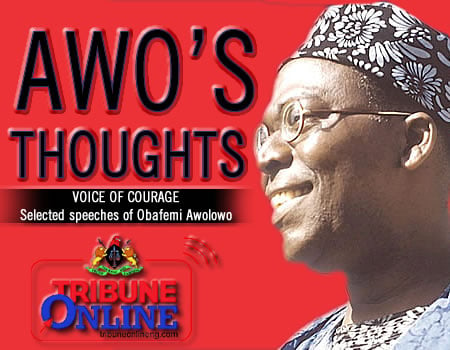CONTINUED FROM LAST WEEK
As long as the barriers to extensive ownership of private property existed, the Africans, like all primitive peoples in other parts of the world, lived a life of simplicity and contentment, which was comparatively free from the greed and naked self-interest that are prevalent in capitalist society. But as soon as these barriers were removed and a money economy was introduced, coupled with improvement in communications, the passion for the greedy accumulation of wealth became as sharp, venomous, and devastating in the Africans as in the other human inhabitants of the globe. In the third place, in speaking of pragmatic socialism, there is an obvious confusion between ends on the one hand, and methods of approach on the other. Viewed from any standpoint, whether it is the Marxist, the Maoist, the Titoist, or our own brand of socialism, the normative social objectives are the same, whilst the methods of approach are conspicuously different from one another. If circumstances so dictate, a pragmatic approach to the attainment of socialist goals in a particular country may be adopted. But the fact that a particular tactic is adopted does not in any way alter the fundamental ends, or thereby necessarily make such ends pragmatic in themselves .. We would like to point out that, in the foregoing sense, democratic socialism is on the same footing as pragmatic socialism. With this important difference that, while pragmatic socialism may be democratic or otherwise in its approach to socialism, democratic socialism must of necessity be democratic in its methods – at any rate, in the manner of its deep contemplation and actual planning by its adherents.
Mental Magnitude
THE SOLE OBJECT of our discourse in this book is man. So far, we have seen him as a member of a family and of the State, possessing rights and owing obligations. We have seen him as a consumer and producer, as well as an agent of production playing a part as the supplier of one or more of the four factors of production: land, labour, capital, and entrepreneurship. His success, in any sphere whatsoever in which he operates, depends wholly on the degree of his health, his intellectual comprehension, and spiritual depth. This is because the coefficient of his efficiency in all undertakings generally, and of his productivity in any economic venture in particular, is education in every sense of the word. A proper knowledge of man, therefore, and a thorough appreciation and competent application of the principles which must govern his physical culture, his mental development, and his spiritual self- realisation, is indispensable to any efforts for promoting and guaranteeing his general well-being and happiness. – ‘What,’ asks the Psalmist, ‘is man, that thou art mindful of him?’ And he proceeds to give an answer in the following words: ‘Thou hast made him a little lower than God, and crownest him with glory and honour. There are many who doubt this assessment of man by the Psalmist. Indeed, the majority of mankind tremble at the suggestion that man is only ‘a little lower than God’, whilst there are many knowledgeable persons who, not believing in the existence of God, can see no rational comparison between man and Him. In the estimation, however, of those who believe in Him, God is a spirit, whilst man is a corporeal physical entity. On the other hand, in the view of the atheists and agnostics, man is just homo sapiens – an evolutionary animal species of the primate class, corporeal in every sense and ‘of the earth’ or ‘earthy’. It is easier for both classes of people – the theists and atheists – to regard man as a being with body – with five senses and with the instincts of self, herd, and sex – than to raise him on to any pedestal where he is remotely comparable with his Creator or any invisible being superior to and outside his physical existence.
Those who think of man in these terms do not realize that they thereby reduce him to a level just as low as, even lower than, that of the animals. We say this because the ordinary brute possesses the five senses sometimes in keener forms than man. The elephant has a better sense of smell than man; and in the keenness of sight and hearing, man is no match for the lion or the tiger. In regard to his instincts, the brute is even more balanced in his development than man. Gluttony is rare among animals; there are no courtesans among their females, nor lechers among their males; and their propensity to acquire material possessions is limited strictly by needs, and never motivated by sheer naked greed.
There is something then which differentiates man from the other animals. We shall seek more particularly to identify that’ ‘something’ later on in this chapter. In the meantime, we will examine man in all his facets as a physical entity, and outline the principles for enhancing his stature as such. As a physical being, he has a body with various organs, nerves, tissues, and innumerable cells. He is endowed with the faculties of sight, hearing, touch, taste, and smell. He has innate dispositions, called instincts, with which Nature endows him at birth and which operate independently of his will, in order to ensure the procreation, preservation, and perpetuation of his species.
CONTINUES NEXT WEEK
YOU SHOULD NOT MISS THESE HEADLINES FROM NIGERIAN TRIBUNE
We Have Not Had Water Supply In Months ― Abeokuta Residents
In spite of the huge investment in the water sector by the government and international organisations, water scarcity has grown to become a perennial nightmare for residents of Abeokuta, the Ogun State capital. This report x-rays the lives and experiences of residents in getting clean, potable and affordable water amidst the surge of COVID-19 cases in the state…
Selfies, video calls and Chinese documentaries: The things you’ll meet onboard Lagos-Ibadan train
The Lagos-Ibadan railway was inaugurated recently for a full paid operation by the Nigerian Railway Corporation after about a year of free test-run. Our reporter joined the train to and fro Lagos from Ibadan and tells his experience in this report…






